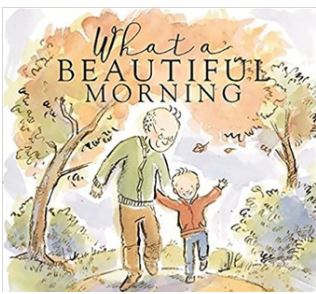What a Beautiful Morning
Reading Guide
By Arthur A. Levine and
Illustrated by Katie Kath
About this Program
The MSU Extension Alzheimer's Awareness for Children Storybook program is designed to teach children about a form of dementia.
The goals of the program are 1) increase awareness andknowledge about Alzheimer's (a form of dementia) and 2) provide supportive resources to children and families when they have a loved one diagnosed with Alzheimer's.
The authors of the reading guides are:
- Jennifer Munter, Volunteer Program Coordinator. Jennifer is a former Early Childhood Educator and has worked with children and their families for over 15 years.
- Marsha A. Goetting, MSU Extension Family Economics Specialist
- Keri Hayes, MSU Extension Program Assistant
Brief Summary
Questions to Ask
- During the summer, Noah stayed with Grandma and Grandpa. What did Noah and Grandpa do every morning?
- Every day, Noah and his Grandpa made a docket or a list of activities they wanted to do.What happened this year that made Noah think Grandpa wasn't the same?
- Grandpa looked scared when Noah woke him from a nap.How did Noah feel when his Grandpa did not know who he was? Who talked to Noah to make him feel better?
- Music helps people with Alzheimer's to remember.What happened to Grandpa when Noah started to play the piano?
- The next morning, Grandma makes coffee for Grandpa and lays out his clothes and a sweatshirt for Noah. What activity does Noah want to do with Grandpa?
Activity Enrichment
- Belly breathing exercise: Have your child lay on his or her back, placing something on their tummy’s (like
a stuffed animal). Encourage them to take belly breaths and watch the object rise and fall. Talk about
how this can help when they are anxious, scared, or mad.
- Home discussion: Talk about the ome or planned routine you already have established. Explain to your child having a plan each day not only helps everyone get things done but it helps take away confusion.You can point out people with Alzheimer's also do better when they have routines and know what to expect each day.
Common Reactions
- Confusion: Children may feel confused about behaviors they see from the person with Alzheimer's.
- Disappointment: Children may feel disappointed when their loved one can no longer do the same activities with them.
- Scared: Children may feel scared when they see their loved one act strangely or treats them differently.
- Joyful: When children frind ways to help their loved ones, they feel proud and joyful.
Other Storybooks and Reading Guides
Other Storybooks and Reading Guides can be found at: https://www.montana.edu/extension/alzheimers/booksandreadingguides.html
Funding for purchase of the storybooks in this program have been made possible by
a grant from the Montana Geriatric Education Center at the University of Montana,
AARP Montana, and by the Endowment fund from National Extension Association of Family
& Consumer Sciences (NEAFCS).




